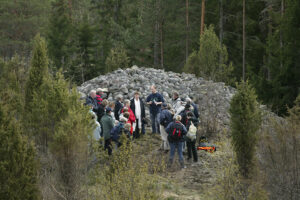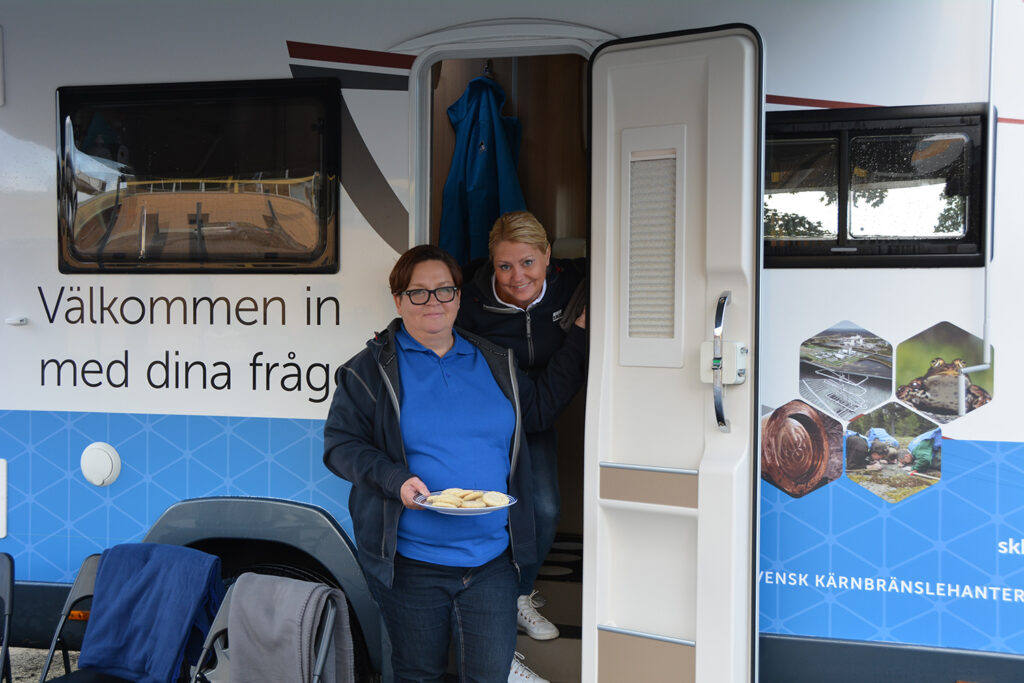Stakeholder communication
A nuclear waste management programme and the development of geological repositories involves research and technology development. It also entails ensuring the safe construction and operation of the facility, and ultimately the post-closure safety of the disposal site. Throughout the process, the activities must be accepted by the local community in the short and longer term. There are many examples of where national programmes have been halted, not due to technical difficulties, but due to lack of trust from key stakeholders or the general public, which has made further advancement of the national programme impossible.
SKB understands what is required for the successful design and specification of a siting programme for identifying and evaluating potential repository sites, and at the same time working actively with stakeholders and the public to obtain local support for our activities. Thanks to these insights, SKB has designed, procured, managed and executed a well communicated and respected site investigation programme in two different communities, gaining an approval rate of 70-80 % from the local inhabitants. Gaining local trust and support takes continuous and active work over decades, and it is here that the implementing organisation must always respect the concerns of others and engage in proactive and honest dialogue.

The Swedish nuclear waste programme recognised early on the importance of communication and public confidence building, partly due to having made the mistake of not informing the public properly in the early phases of the programme. Over time and through the different phases of technical and scientific repository development, especially during the siting phase, information and communication strategies have evolved alongside technical progress. Thanks to the early awareness of the importance of stakeholder communication and involvement, SKB today enjoys very high confidence and local support in the communities in which we operate.
It is our firm belief that SKB’s previous experiences and competence as an implementer of a complete system for the management of nuclear waste, including non-technical issues such as public acceptance, will ensure the best possible support to our clients in their mission to carry out a national programme and to develop the safe disposal of nuclear waste.
Over the years, we have noted that many other implementing organisations are keen to understand the lessons that SKB has learned from engagement with stakeholders in the development of geological disposal facilities in Sweden. SKB’s strategies and plans have been adapted when the company has transited from one programme phase to the next. An internal training programme has been developed for SKB staff to engage appropriately with stakeholders, which builds on lessons learned. What we offer to other implementers of geological disposal is an understanding of this training programme and how it can be tailored for use in their own programmes. The core element primarily consists of an information sharing exercise to provide material that could be of use to the client’s communication staff and/or public and stakeholder engagement team. This typically includes documents containing lessons learned or summarising the work done to date and approach followed, as well as training materials, stakeholder maps, copies of stakeholder communication materials and scope/schedule/cost information etc. relevant to the stakeholder engagement activities carried out until a repository construction permit is granted, or planned for the remainder of the programme.
SKB has the knowledge to support other implementing organisations in how their plans for geological disposal can be most effectively implemented in their national context, taking existing legal, organisational and funding arrangements into account and identifying possible changes, if any, to improve the possibilities for success.
Necessary issues in stakeholder engagement where SKB can provide support:
- helping the client in mapping rules and regulations concerning public involvement and to capturing the experience in the client country from other activities involving stakeholder engagement, such as big infrastructure projects
- informing on the experience from public involvement in Sweden and other countries where SKB has been involved
- discussing different methods of involving local authorities in the siting activities, in particular in understanding the advantages and disadvantages of hosting a geological repository facility and its ancillary facilities and functions
- discussing and developing a plan for public involvement at the different stages of implementing the nuclear waste management programme
- developing a programme for national consultations on a geological disposal facility for nuclear waste or spent nuclear fuel. This can also include transboundary consultations under the Esbo convention.
- developing policies, strategies, instructions and routines for carrying out an active outreach programme with potential host communities
- drafting internal plans and strategies, for instance risk and incident management concerning stakeholder involvement
How we support you
SKB has carried out many activities for the Swedish programme and thus has first-hand knowledge of the possibilities and difficulties associated with public involvement at the various stages, from the first outreach activities and feasibility studies in interested municipalities, to siting activities in selected candidate communities, as well as during the construction and operation of the nuclear facilities.
